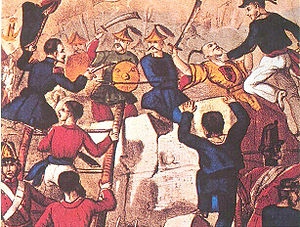“Herr Reinhardt! Herr Reinhardt!” a soldier suddenly burst through the door of the small 16th Century house. All eyes of the small packed room looked up as General Friedrich Reinhardt stood from the table laid out with orders and paperwork. The 30 or so Prussian soldiers stood up from the chairs and watched as the General paced towards the beckoning messenger. After saluting his superior the soldier lay his musket and began, “General Reinhardt, I have new orders for you from General Erwin zur Lippe, we are to march to Aachen and the Belgian border and defend against intruding Belgian forces!”
“Are you certain? Come and walk with me soldier” Friedrich commanded as he opened the small cottage door. As they walked down the path through the frozen city of Siegburg the messenger explained the situation, “…and you see General Reinhardt, it seems that a number of the farmers on the border with Belgium spotted a bunch of soldiers riding across the border”.
“Rally the troops of the VI. Korps, we march to Aachen!”
The Georg Johannes Incident
On February 14th 1837, Georg Johannes, a Prussian National, was caught spying on the Prussian-Belgian border and was arrested by the Belgian military. While the government did not recognize Johannes as a government informant, it was claimed by the Rheinlander farmers living near the ancient city of Aachen that the arrest culminated in a pitched chase and that Belgian soldiers crossed the border illegally without Prussian allowance and arrested the citizen within the territory of Prussia. King Friedrich Wilhelm and his cabinet demanded a formal apology from the recently crowned Leopold I of Belgium. When the demands were rejected by the government of Belgium, Prussian soldiers mobilized near the Prusso-Belgian border. War was only averted when the United Kingdom stepped in forced Belgium to make a statement while forcing Prussia to withdraw troops from the border. While both sides accepted this, British-Prussian relations were strained and King Friedrich Wilhelm revoked his recognition Belgium and began to back the Netherlands in the conflict. The strain in relations also caused the British to begin an anti-Prussian campaign in the protectorate of Hanover to attempt and discredit the name of Prussia within the union Kingdom.
Minority Building Restrictions
Later in the month of February, King Friedrich Wilhelm and his advisors decided to impose building restrictions on the Polish minority. The act made it illegal for any man of Polish blood to build or own land within the territory of the Prussian Kingdom. While this act assisted in the assimilation of the Poles, it attributed to the growing cultural instability in the region.
South America's Great War
In South America was the beginning of the massive Mato Grosso War, or South America’s Great War as it would later be known, between the French-allied Brazilian Empire and the Dictatorships of Uruguay, Paraguay and Peru. This effected the German states as Prussian general Joachim von Raunch organised a German volunteer cavalry brigade and fought alongside the armies of Uruguay, Paraguay and Peru to fight against "the creation of a French-orientated Empire in the Americas". While not supported by Prussia officially, the general received secret funding from the legislative assembly in Berlin.
Prussian General Joachim von Raunch leads the charge at the battle of Rio Branco infamously hoisting the colours of Red, Black and Yellow. This lead to German flag designs decades later
The Pro-Austrian Sphere
In reaction the strong unity of the Protestant League in Northern Germany, the Emperor of Austria formed his own group of nations within the German Confederation and began to further the split in the German Confederation. Now it seemed certain that the Pro-Prussianist Protestant League and the Pro-Austrianist Grand Duchies of Saxony, Bavaria and Baden would one day be at war. It was only a matter of time in eyes of the German people.
The Anglo-Chinese Wars
In the East, September 27th 1837 saw the eruption of war between the United Kingdom and the Qing Chinese Empire. The Chinese had invaded Northern Burma in the Haka Wars (1836) and annexed the region disregarding the British demands for peace. When the Haka Wars ended the entirety of northern Burma (primarily the Haka region) was ceded to China, the British Empire declared war on China. The War was the climax of Anglo-Chinese tensions that had begun with the Opium Crisis of March in which the Chinese Emperor was forced to continue Opium trade. Thus the Anglo-Chinese War began.
British India Corps attack a Chinese fort in the Haka region of northern Burma
The Schleswig-Holstein Crisis
Throughout the last months of 1837, Prusso-Danish tensions peaked massively after word traveled from Denmark that German peasantry was being treated harshly by the Kingdom of Denmark and its satellite state Holstein. Two Korps of 51,000 Prussian Infantry and Cavalry marched on the border with Holstein under command of the highly decorated Prussian Generals, Joachim von Raunch, who recently returned from the Mato Grosso War, and Albrecht von Oldenberg. As tensions sky-rocketed both Portugal and the King Wilhelm I of Württemberg both denied support for Prussia in the conflict. As a jingoist society, Karl von Boehm and the other aristocratic members of the King’s cabinet demanded that both the territories of Schleswig and Holstein be ceded to the Kingdom of Prussia. The eyes of the world watched and knew that if that the aggression of Prussia could not be satisfied than war would be inevitable within a week.











